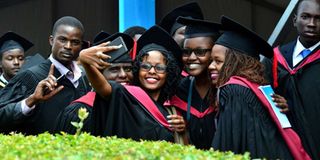UoN old-timer professors bow out of lecture halls

University of Nairobi graduands take a selfie during a graduation ceremony held on September 22, 2017.
What you need to know:
- Prof Gichaga, an engineering expert has been supervising masters’ and PhD students in the College of Architecture and Engineering since he retired as vice-chancellor in 2002
- Prof Keya, is an expert in land resources management and agriculture technology, while Prof Mbeche was based at the School of Business as a management specialist.
The University of Nairobi has terminated teaching contracts for three former vice-chancellors and two professors in a bold move by the institution’s council to inject new ideas and younger blood into the lecture halls.
They are Prof Francis Gichaga, who served as the institution’s vice-chancellor for 11 years, Prof Shem Wandiga who was a deputy vice-chancellor for administration and finance for seven years, Prof Isaac Mbeche, a former acting vice-chancellor, Prof Shellamiah Keya, a former vice-chancellor at Moi University for 11 years and literature professor Wanjiku Kabira.
The five have been teaching at the university on contract, but according to vice-chancellor Stephen Kiama Gitahi, they have reached the retirement age of 70 years and “must now take the role of professor emeritus.”
Professor emeritus is an honorary title recognising distinguished academic service and is conferred strictly on merit. It is given to fully retired professors after approval by the vice-chancellor.
Prof Gichaga, an engineering expert has been supervising masters’ and PhD students in the College of Architecture and Engineering since he retired as vice-chancellor in 2002, while Prof Wandiga, is a chemistry academic and has been lecturing at the Department of Chemistry.
Prof Keya, is an expert in land resources management and agriculture technology, while Prof Mbeche was based at the School of Business as a management specialist. Prof Kabira is a renowned literature scholar.
Hardworking and respectable
Prof Kiama described the scholars as “hugely remarkable, hardworking and respectable’’ adding that he expects them to proceed to the next academic level as professors emeritus.
“We have guidelines on how to confer the emeritus title to long-serving professors and we really want to make it a tradition so that we don’t block younger lecturers from taking over critical academic roles,” he said on the telephone.
He added: “You cannot continue to keep people who have retired on the payroll. Universities that are run by retired people cannot compete effectively and there must be a clear opportunity to bring on board new people with new ideas and energy. Again, there is also always the temptation to develop a misguided sense of ownership of the institution if individuals continue working even after retirement.”
According to the university’s guidelines, a professor emeritus must be a full professor at the time of leaving service upon mandatory or voluntary retirement and must have served the institution for at least 10 years, five of which as full professor.
Professor emeritus responsibilities include; mentorship of staff and student, supporting grant proposal development, anchoring PhD supervision and attracting and anchoring eminent guest lecturers.
The title is permanent and such academicians are full members of the senate although the position carries no statutory compensation in form of a salary. However, the holders may earn a percentage of administrative fees paid to the university for their projects.
“The university may reimburse expenses incurred during the discharge of official assignments and if necessary university housing may be availed and a medical cover not exceeding Sh2 million per year. The holders may also be entitled to university email, office space, car parking library and clubs,” the guidelines, which are meant to be effective in the 2020/21 academic year,” says the guidelines.
Changing technology
The guidelines, developed by the university council, say staff of post-retirement contracts prevent others from coming on board and exert pressure on the wage bill and medical costs “since such staff are mostly on medication for chronic conditions.”
“Most of the retired staff are not dynamic and are challenged by changing technology as they struggle to remain relevant. Some are known to frustrate implementation of programmes that require them to keep abreast with technology,” says the document. It says younger staff may be demotivated when they see positions for their career progression being held by people who have retired.
“Since the body becomes weak with age, the staff may not be productive in teaching and research even though they continue drawing salaries. Productivity may be reduced due to age-related dementia and the fact that such lecturers may be given reduced work load but on full pay. There is also the risk that consideration of staff for post-retirement contracts may be based on empathy rather than resourcefulness.”
A circular to public corporations from the Head of Public Service in 2014 warned parastatal heads against retaining staff who have reached retirement age due to “wage bill sustainability.”




